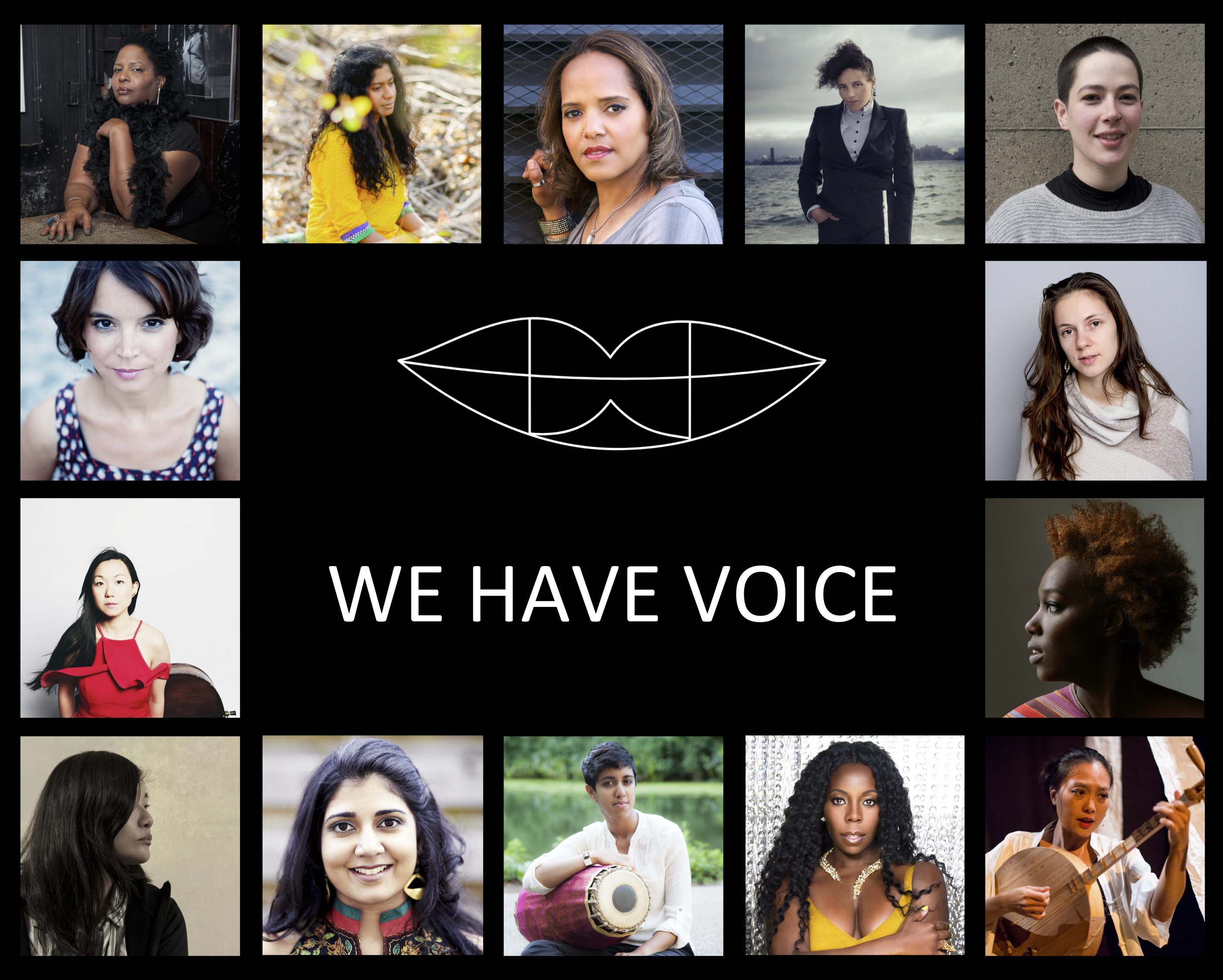As part of the groundswell of activism that has emerged from the #MeToo movement, the We Have Voice Collective–an organization composed of fourteen female and non-binary artists–has issued a code of conduct demanding zero tolerance of harassment of any kind in the performing arts. The collective is composed of artists who represent a diverse array of musical styles and accomplishments: Fay Victor, Ganavya Doraiswamy, Imani Uzuri, Jen Shyu, Kavita Shah, Linda May Han Oh, María Grand, Nicole Mitchell, Okkyung Lee, Rajna Swaminathan, Sara Serpa, Tamar Sella, Terri Lyne Carrington, and Tia Fuller.
The need for this is crystal clear. Sexism, harassment, bullying, and exclusion all remain rampant problems in performing arts communities. Take, for example, a simple sampling of concert listings with a retinue of mostly or all-male bills. Or look, as Sarah Manning so boldly detailed, how women are treated by the recording industry as marginal, non-essential, or interchangeable. Also consider the casual objectification that women performers face in music journalism or on the bandstand where they are identified by their gender first and foremost before their accomplishments are listed or they are honored as innovators or leaders in their respective genres. Or, as many women and queer artists have divulged to me during interviews of just how much energy and time they must spend dealing with everyday sexism. Some men see it too.
Much of the challenge for performing artists is that they work in what are often informal spaces or places often not regarded as workplaces such as clubs, bars, artist lofts, rehearsal spaces, galleries, hotel rooms, and private homes, among others. In such spaces, harassment and assault are not unusual. The potential threat of harassment or assault is a significant factor in marginalizing many performers.
So what action can be taken to change the community and revolutionize the way people interact with and treat each other? We Have Voice Collective advocates transforming all of these spaces and human relationships to bring them in line with the standards of workplaces that most people in other professions can already count on. The problem addressed by the code is an endemic one and the call for change is long overdue.
The We Have Voice code makes six demands:
- What is a safe(r) space? A Safe(r) Space is a balanced, healthy space where all people feel valued and respected. *The term “safe(r)” espouses an intersectional approach to the term “safe,” acknowledging that what is “safe” shifts depending on one’s various identities and positionalities.
- How can we commit to creating safe(r) spaces in the performing arts?
- Speak up, seek support, or ask for help when witnessing, experiencing, or suspecting any form of harassment. Your silence may enable an abusive situation.
- Create mechanisms and/or designate persons in your workplace to provide support when needed, allowing people to raise their concerns without fear of retaliation. Listen and respond in a way that safeguards the position of those speaking up.
- Communicate your institution’s anti-harassment policies and zero-tolerance protocol clearly to employees, partners, and colleagues at the outset of any work relationship.
- Work collectively to combat bias and stereotypes. Take deliberate steps to root them out and minimize their impact.
- Foster diversity in your role as curator, bandleader, conductor, director, producer, journalist, audience member, artist, or in foundations, organizations, institutions, or non-profits. All people benefit when Performing Arts spaces are diverse in gender, age, sexual orientation, race, culture, nationality, class position, financial status, religious affiliation, and differing abilities.
- How is sexual harassment defined by law? Sexual Harassment in the workplace is a crime:
- Quid pro quo sexual harassment is when a term or condition of employment is contingent upon the acceptance of unwelcome sexual behavior.
- Hostile work environment sexual harassment is when unwelcome sexual
behavior of any kind creates an abusive work environment.
- What is a workplace? A Workplace, whether physical or virtual, can include but is not limited to a stage, dressing room, office, recording studio, classroom, venue/club, jam session, workshop, residency, rehearsal space, private residence/home studio, hotel room, gallery, social media platform, and communication that involves professional matters.
- What is consent? Consent is a clear and unambiguous agreement to engage in a particular activity. It is expressed outwardly through mutually understandable words or actions.
- Consent is reciprocal and free of force.
- Minors, by virtue of being minors, cannot give consent.
- Someone incapacitated due to drug, alcohol or other substance use cannot give consent.
- What impacts consent?
- Force: Force can be physical, psychological or emotional. Examples include but are not limited to: grabbing, touching, manipulation, stalking, exposing oneself, holding someone down, using weapons, verbal threats, peer pressure, blackmail, guilt, or coercion.
- Power Dynamics: Power Dynamics exist in relationships
between employer/employee, teacher/student, bandleader/collaborator,
director or producer/artist, festival promoter/artist, manager/artist, booking agent/artist, artist/audience, etc. Abuse of Power occurs when offenders use their position to control, manipulate or take advantage of another. Prestige, elder status, institutional clout, or financial power does not grant anyone permission to be abusive.
Jazz Right Now has joined together with ten other international organizations in endorsing and adopting the We Have Voice Collective’s code. Other organizations include educational institutions such as Banff International Workshop in Jazz & Creative Music and Summer Music at Banff, arts organizations Arts for Art/Vision Festival, Winter Jazz Fest/Boom Collective, New York Jazz Workshop, and our sponsoring organization New Revolution Arts, the venues I-Beam and Pioneer Works, and the record label Biophilia Records. This list will surely continue to grow as the movement builds. If you wish to show support for We Have Voice’s mission, please endorse it here.


1 comment
Join the conversationWeHave Voice & The Code of Conduct for the Performing Arts – Fay Victor - May 5, 2018
[…] Workers Day). The launch was buoyed by great coverage in the New York Times, NPR, and JazzRightNow.com. There is less information on where to go as performing arts workspaces are fluid, sometimes […]
Comments are closed.